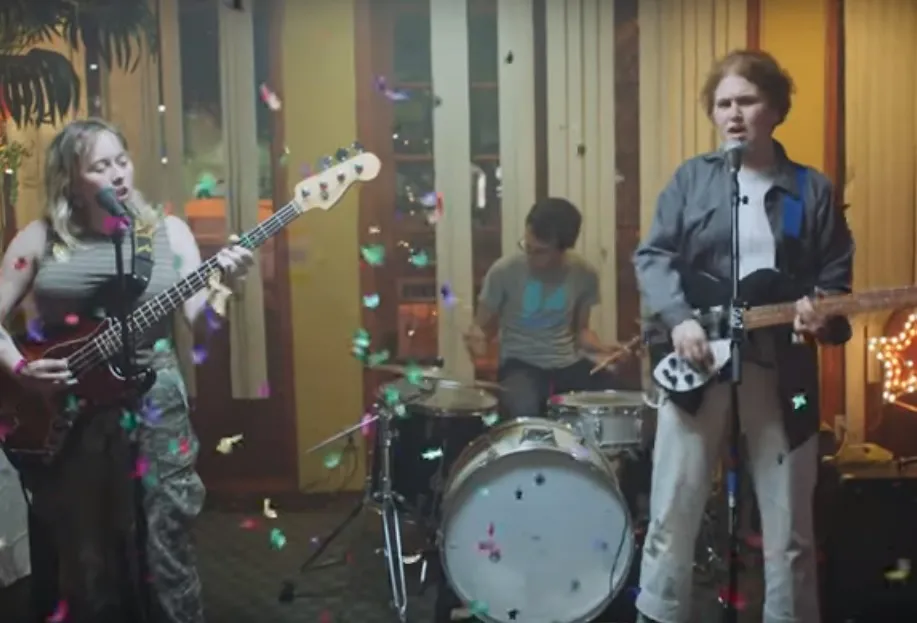Whether it’s us or the world that’s in flux, change is inevitable. We experience states of transition on personal, social, societal, and global levels all the damn time, and frankly, it’s exhausting. In their 2014 self-titled EP, Girlpool explored these transitional states, searching the dimensions of their burgeoning womanhood within “a fucked society.” Their songs provide the sort of exquisite mantras that every woman needs whispered into her ear during times of upheaval.
Released while band members Cleo Tucker and Harmony Tividad were still in high school, the EP was a feminist outcry from two young women refusing to accept the world as it was handed down to them. On Girlpool, the changes of adolescence were offset against a society in desperate need of change itself. On “Slutmouth,” for instance, the band identify and clap back against the tiresome traps of domestic micro-aggressions as they sing, “I don’t really care about the clothes I wear/ I don’t really care to brush my hair/ I go to school every day/ Just to be made a housewife someday.” On Girlpool, the band were outspoken in their resistance to having to change themselves for society, or to be polite in their expression of female identity.
Happy to reduce toxic masculinity to an incoherent babble on “Blah Blah Blah,” the band occupy their own gender identity and sexuality with confidence and without apology. Whether it’s demanding, “it’s not enough to watch a movie/ eat me out to American Beauty,” or bemoaning, “I’ll never understand what it means to be a man,” Girlpool was an excitable howl that presented young girls refusing to be quiet and transforming into grown women who were even louder and more prescient.
By the time their first full length album, Before The World Was Big, was released in 2015, the band were gazing inward, delivering knife-edged, suburban nursery rhymes about the dysphoria of growing up. The album presents childhood as a spectre fading into the colossal abyss of an overwhelming and complex world. Their minimalist instrumentation gives their lyricism a mournful disquiet, in which ideas of feminist actualization are replaced with ones of radical self-care.
Be it the painful deliberation of, “If I loved myself, would I take it the wrong way?” from “Chinatown.” Or the dynamic self-efficacy of the line, “Truth is that I am working/ For myself and only me,” from “Cherry Picking.” Before The World Was Big presents the idea of grappling with painful changes while desperately trying to maintain the self. It’s an album that identifies the allure of life before everything changed. It yearns for the childhood naivety of feeling like you belong in the world, at a time when “wearing matching dresses” with your best friend is the greatest sense of self and belonging you can and may ever feel.
On “Emily,” however, the futility of fixating on childhood memories to connect with an expired moment in time is aligned with attempts at “having seances,” while incense burns, “like our age.” The songs refrain, “I’m still here/ remember me,” performs a vital reminder to connect with the present, instead, and to recognize that some people—and relationships—can remain firm and constant amid major changes.
Before The World Was Big struggles with the consolidation of childhood and adult identity within complicated spaces. But it also quietly acknowledges the tender beauty of the present with a cautious eye and the power of the self to reckon with the vastness of the world and the changes it presents at any one time.
In 2017, Girlpool’s second album, Powerplant, revealed a sound big enough to harness exactly this power, with the band taking great joy in simple things like getting “lost at the corner store,” and living in “a gallery that no one’s ever seen.” That is, inhabiting smaller, more intimate, and manageable spaces that feel anonymous, private, and true, including the potential to “crawl into a birdcage,” or “become a cartoon,” as the narrator urges in “Soup.” These are positive, personal changes, suggesting an essential need for escapism, particularly from the great noise of the world as outlined in Girlpool and Before The World Was Big.
Thematically, Girlpool are timeless in this way, presenting modes of resistance that are accessible to anyone at any age who is still trying to figure out the dimensions of their identity, womanhood, and the world itself. The band offers a space for rage and defiance alongside another that is hushed and sombre. They encourage exploration—of the self, of sex, of society, of even swimming in Seattle—while advocating for care and safety in doing so.
In an interview with DIY Mag, Tavidad explained that Powerplant expressed how “every arena [of life] has a period of passing through. You’re always passing through things, and arriving, and passing through.” No matter how old you are, that “arena of life” never actually ends. You’re always in the process of leaving one phase to get to another. At the very least, Girlpool have managed to provide the sort of music and mantras that can help soften—or excite—that process at any stage.
(image: Anti Records)
Amy Roberts (@alabamaroxanne) is a freelance writer based in Liverpool, UK. She’s the co-founder and editor of the pop culture blog Clarissa Explains Fuck All, and an entertainment features writer for Bustle. When she isn’t writing, Amy makes a lot of noise in the punk band Aüralskit, and watches far too many horror movies. She’s currently working on Bodies, a collection of noise recordings and spoken word poetry that explores the body as a consumable in horror and within society itself.
Want more stories like this? Become a subscriber and support the site!
—The Mary Sue has a strict comment policy that forbids, but is not limited to, personal insults toward anyone, hate speech, and trolling.—









Published: Aug 25, 2017 03:40 pm